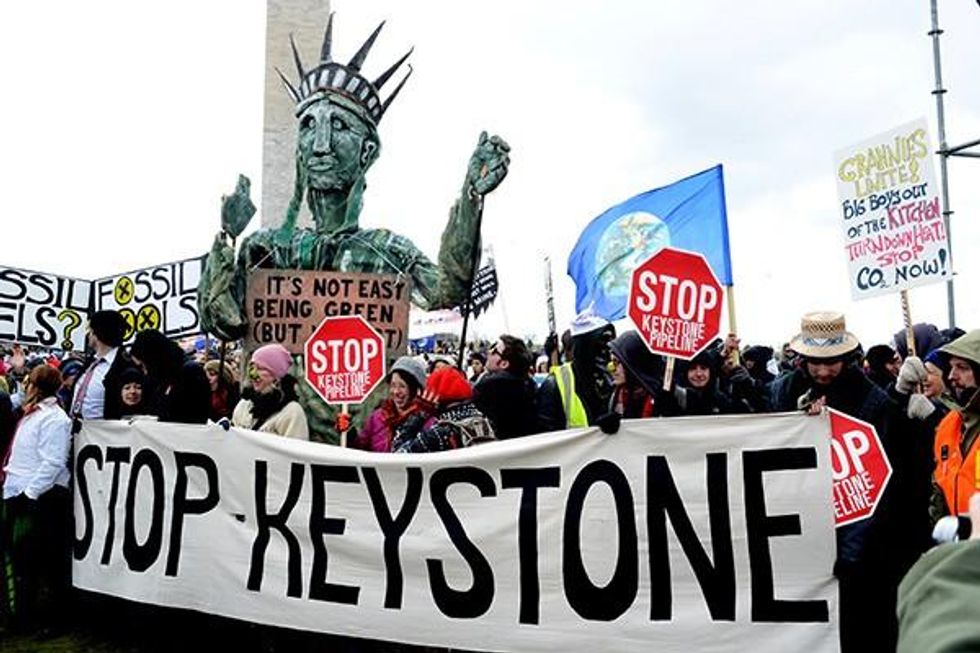NRDC: Keystone XL Approval = Path to Climate Disaster
New analysis from group shows how the tar sands carrying pipeline fails President Obama's own test for its approval.

"Our analysis clearly demonstrates that the Keystone XL pipeline would dramatically boost the development of dirty tar sands oil, significantly exacerbating the problem of climate pollution," Susan Casey-Lefkowitz, director of NRDC's international program, said in a statement.
The pipeline would add up to 1.2 billion metric tons of carbon pollution to the atmosphere over the 50-year span of the project, according to the economic and climate analysis from the group. And, adds Casey-Lefkowitz, "this is without taking climate pollution from destruction of Boreal peatlands and wetlands into account."
The group quotes Obama's climate address from June when he said:
Our national interest will be served only if this project does not significantly exacerbate the problem of carbon pollution. The net effects of the pipeline's impact on our climate will be absolutely critical to determining whether this project is allowed to go forward.
As the report details how tar sands are more carbon-intensive than traditional crude, the group says the pipeline would fail the president's own climate test for approving the project. Following the climate speech, DeSmogBlog pointed out, "You can't be a leader on climate action if you're a willing accomplice in accelerating the expansion of one of the largest carbon bombs on the planet."

Rejecting the Keystone XL also means rejecting tar sands, the group says, as other pipelines out of Alberta are at or near capacity, and tar sands refineries are limited. Further, tar sands by rail is costly, making train export of the heavy crude an unlikely possibility.
"Approve [the Keystone XL], and our children's future is jeopardized. Deny it, and we'll avoid sending over a billion tons of additional carbon pollution into the air," said Casey-Lefkowitz. "The right choice is obvious: Keystone XL fails the president's climate test and he should reject it to protect our national interest."
_______________________
An Urgent Message From Our Co-Founder
Dear Common Dreams reader, The U.S. is on a fast track to authoritarianism like nothing I've ever seen. Meanwhile, corporate news outlets are utterly capitulating to Trump, twisting their coverage to avoid drawing his ire while lining up to stuff cash in his pockets. That's why I believe that Common Dreams is doing the best and most consequential reporting that we've ever done. Our small but mighty team is a progressive reporting powerhouse, covering the news every day that the corporate media never will. Our mission has always been simple: To inform. To inspire. And to ignite change for the common good. Now here's the key piece that I want all our readers to understand: None of this would be possible without your financial support. That's not just some fundraising cliche. It's the absolute and literal truth. We don't accept corporate advertising and never will. We don't have a paywall because we don't think people should be blocked from critical news based on their ability to pay. Everything we do is funded by the donations of readers like you. Will you donate now to help power the nonprofit, independent reporting of Common Dreams? Thank you for being a vital member of our community. Together, we can keep independent journalism alive when it’s needed most. - Craig Brown, Co-founder |

"Our analysis clearly demonstrates that the Keystone XL pipeline would dramatically boost the development of dirty tar sands oil, significantly exacerbating the problem of climate pollution," Susan Casey-Lefkowitz, director of NRDC's international program, said in a statement.
The pipeline would add up to 1.2 billion metric tons of carbon pollution to the atmosphere over the 50-year span of the project, according to the economic and climate analysis from the group. And, adds Casey-Lefkowitz, "this is without taking climate pollution from destruction of Boreal peatlands and wetlands into account."
The group quotes Obama's climate address from June when he said:
Our national interest will be served only if this project does not significantly exacerbate the problem of carbon pollution. The net effects of the pipeline's impact on our climate will be absolutely critical to determining whether this project is allowed to go forward.
As the report details how tar sands are more carbon-intensive than traditional crude, the group says the pipeline would fail the president's own climate test for approving the project. Following the climate speech, DeSmogBlog pointed out, "You can't be a leader on climate action if you're a willing accomplice in accelerating the expansion of one of the largest carbon bombs on the planet."

Rejecting the Keystone XL also means rejecting tar sands, the group says, as other pipelines out of Alberta are at or near capacity, and tar sands refineries are limited. Further, tar sands by rail is costly, making train export of the heavy crude an unlikely possibility.
"Approve [the Keystone XL], and our children's future is jeopardized. Deny it, and we'll avoid sending over a billion tons of additional carbon pollution into the air," said Casey-Lefkowitz. "The right choice is obvious: Keystone XL fails the president's climate test and he should reject it to protect our national interest."
_______________________

"Our analysis clearly demonstrates that the Keystone XL pipeline would dramatically boost the development of dirty tar sands oil, significantly exacerbating the problem of climate pollution," Susan Casey-Lefkowitz, director of NRDC's international program, said in a statement.
The pipeline would add up to 1.2 billion metric tons of carbon pollution to the atmosphere over the 50-year span of the project, according to the economic and climate analysis from the group. And, adds Casey-Lefkowitz, "this is without taking climate pollution from destruction of Boreal peatlands and wetlands into account."
The group quotes Obama's climate address from June when he said:
Our national interest will be served only if this project does not significantly exacerbate the problem of carbon pollution. The net effects of the pipeline's impact on our climate will be absolutely critical to determining whether this project is allowed to go forward.
As the report details how tar sands are more carbon-intensive than traditional crude, the group says the pipeline would fail the president's own climate test for approving the project. Following the climate speech, DeSmogBlog pointed out, "You can't be a leader on climate action if you're a willing accomplice in accelerating the expansion of one of the largest carbon bombs on the planet."

Rejecting the Keystone XL also means rejecting tar sands, the group says, as other pipelines out of Alberta are at or near capacity, and tar sands refineries are limited. Further, tar sands by rail is costly, making train export of the heavy crude an unlikely possibility.
"Approve [the Keystone XL], and our children's future is jeopardized. Deny it, and we'll avoid sending over a billion tons of additional carbon pollution into the air," said Casey-Lefkowitz. "The right choice is obvious: Keystone XL fails the president's climate test and he should reject it to protect our national interest."
_______________________

